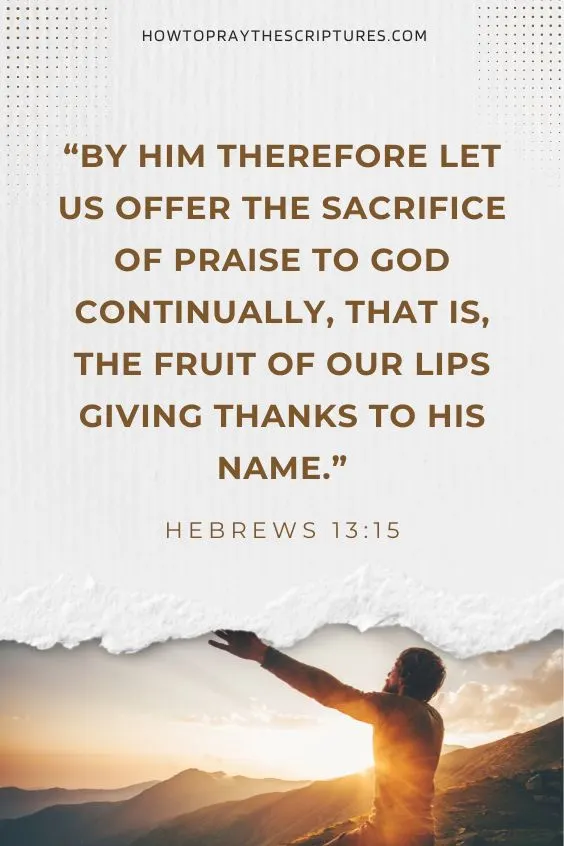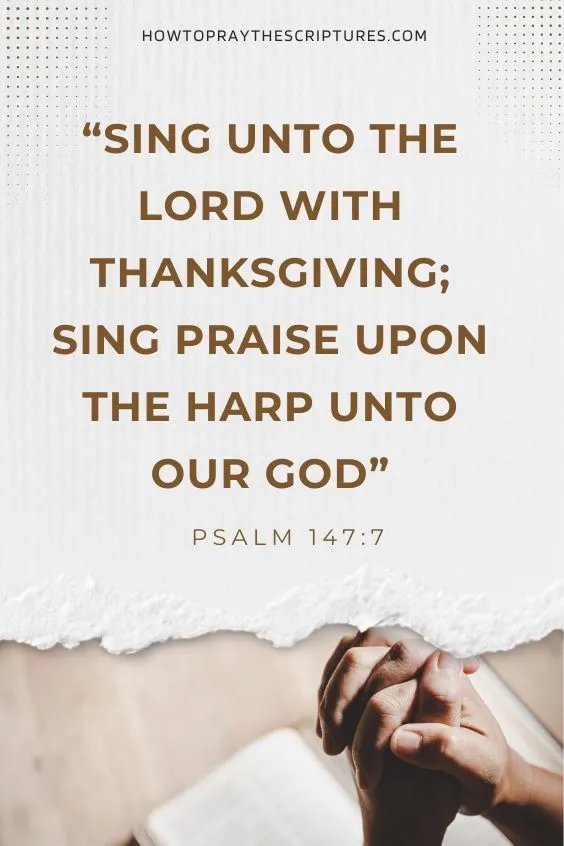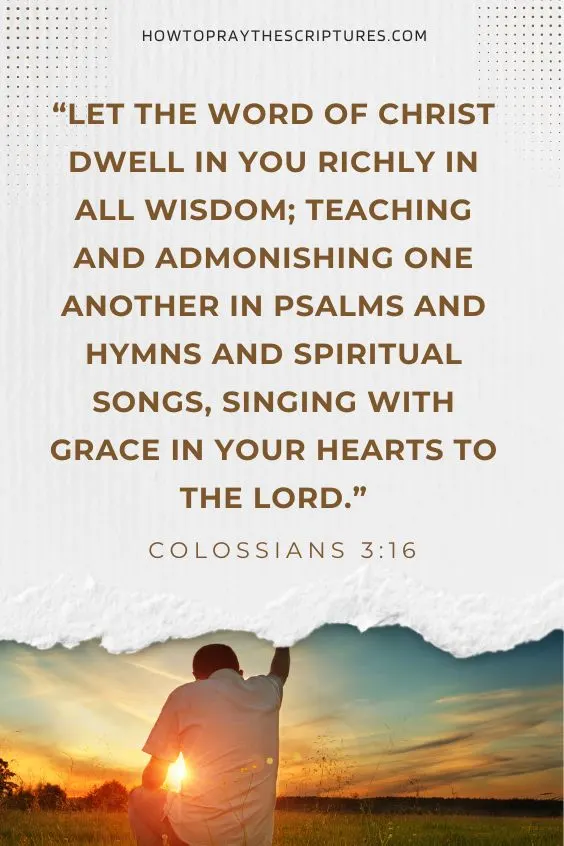In a world where life often presents challenges and uncertainties, the human spirit seeks solace and hope by showing gratitude to a higher power. The act of expressing thanks to God transcends cultural and religious boundaries, offering a sense of purpose and connectedness to something greater than ourselves [Psalm 103:1-4].
Gratitude is an emotion that can uplift our souls, infusing our lives with joy and humility. Below we will explore the art of expressing gratitude to God through words, delving into two subtopics: the poetry of praise and the language of personal testimony.

How do you express gratitude to God in words
The Poetry of Praise
Poetry transcends the boundaries of conventional expressions, enabling us to paint vivid pictures of God’s majesty using the beauty of nature and the wonders of the cosmos [Isaiah 12:4-5 (NASB). Additionally, we delve into the captivating melodies of sacred songs and hymns that elevate our spirits, carrying messages of gratitude and devotion through the ages.
(And in that day shall ye say, Praise the Lord, call upon his name, declare his doings among the people, make mention that his name is exalted. Sing unto the Lord; for he hath done excellent things: this is known in all the earth. Isaiah 12:4-5)

How do you express gratitude to God in words
Divine Metaphors: Celebrating the Creator
To express gratitude to God in words, we often find ourselves turning to the realm of poetry [Psalm 7:1]. The art of poetic language allows us to weave intricate metaphors that describe the majesty and wonders of the Divine. By likening God to nature’s breathtaking beauty or the cosmic dance of the stars, we create a tapestry of admiration that transcends the limitations of language [Hebrews 13:15]. (By him therefore let us offer the sacrifice of praise to God continually, that is, the fruit of our lips giving thanks to his name. Hebrews 13:15)

How do you express gratitude to God in words
Poetic expressions of gratitude enable us to view the world with fresh eyes, recognizing the intricate connections between all living beings and the cosmos. We may compare God’s love to the gentle embrace of a mother’s arms or the warmth of the sun on a chilly morning [1 Chronicles 16:34 (ESV)]. By doing so, we rekindle our reverence for the world around us, finding solace in the understanding that we are part of a grand tapestry woven by the hands of the Divine [Psalm 95:1-5 (NKJV)]. (O give thanks unto the Lord; for he is good; for his mercy endureth for ever. 1 Chronicles 16:34)

How do you express gratitude to God in words
Melodies of the Heart: Sacred Songs and Hymns
Another profound way to express gratitude to God is through sacred songs and hymns [Colossians 3:15-17]. Music, with its power to evoke powerful emotions, touches the core of our being, making it an ideal vessel for expressing devotion and thanks. Across cultures and religions, hymns have played a central role in spiritual practices, carrying messages of gratitude and praise from generation to generation [Ephesians 5:18-20].
The heartfelt lyrics and melodious tunes of sacred songs create an atmosphere of transcendence, lifting our spirits to a realm where words alone fall short [Jonah 2:9]. Whether it is the haunting chants of Gregorian hymns or the soul-stirring qawwalis of Sufi tradition, these melodies have the power to instill a profound sense of gratitude, humility, and surrender to the Divine [Psalm 147:7]. (Sing unto the Lord with thanksgiving; sing praise upon the harp unto our God: Psalm 147:7)

How do you express gratitude to God in words
The Language of Personal Testimony
While poetic expressions may soar to celestial heights, the language of personal testimony grounds our gratitude in the realm of daily experiences [Colossians 3:16]. (Let the word of Christ dwell in you richly in all wisdom; teaching and admonishing one another in psalms and hymns and spiritual songs, singing with grace in your hearts to the Lord. Colossians 3:16)

How do you express gratitude to God in words
Gratitude Journals: An Intimate Dialogue with the Divine
Beyond the realm of poetic expressions and sacred hymns lies the personal testimony of gratitude, expressed through personal journals [John 15:27]. Gratitude journals have become a popular practice in recent times, encouraging individuals to document their daily blessings and express appreciation for the seemingly mundane aspects of life. (And ye also shall bear witness, because ye have been with me from the beginning. John 15:27)
Through the act of journaling, we engage in a candid and intimate dialogue with the Divine, recounting our joys, triumphs, and trials with a grateful heart [Psalm 9:1]. By recording moments of gratitude, we cultivate a habit of mindfulness, shifting our focus from what is lacking to what we have been blessed with [1 Thessalonians 5:18 KJV]. (I will praise thee, O Lord, with my whole heart; I will shew forth all thy marvellous works. Psalm 9:1) (In every thing give thanks: for this is the will of God in Christ Jesus concerning you. 1 Thessalonians 5:18)
Acts of Kindness: Gratitude in Action
The most potent form of expressing gratitude to God is through acts of kindness towards others [Matthew 5:13]. By extending a helping hand to those in need, we acknowledge the interconnectedness of all living beings and recognize the divinity within each soul. Acts of kindness are like prayers in action, where gratitude flows not merely through words, but through deeds that manifest our appreciation for the blessings we have received [1 Chronicles 16:8]. (Ye are the salt of the earth: but if the salt have lost his savour, wherewith shall it be salted? it is thenceforth good for nothing, but to be cast out, and to be trodden under foot of men. Matthew 5:13) (Give thanks unto the Lord, call upon his name, make known his deeds among the people. 1 Chronicles 16:8)
Through volunteering, donating, or simply being compassionate and understanding, we become instruments of divine grace, reflecting the goodness bestowed upon us [Matthew 5:16]. In such selfless actions, we uncover the profound truth that gratitude is not just a feeling, but a transformative force that can change lives and create ripples of positivity throughout the world [2 Corinthians 9:13]. (Whiles by the experiment of this ministration they glorify God for your professed subjection unto the gospel of Christ, and for your liberal distribution unto them, and unto all men; 2 Corinthians 9:13)
Conclusion
Expressing gratitude to God in words is a journey that takes us beyond the realms of ordinary language. Through the poetry of praise, we find ourselves immersed in a world of metaphors that celebrate the vastness and beauty of the Divine [Psalm 95:2]. In the language of personal testimony, we discover the power of introspection and the value of counting our blessings, recognizing the miracles that surround us every day. (Let us come before his presence with thanksgiving, and make a joyful noise unto him with psalms.Psalm 95:2)
Gratitude is a powerful practice that elevates our souls and nurtures our connection with the Divine. It is an art that beckons us to acknowledge the gifts we have received and share them with others. In this sacred dance of thanksgiving, we become both givers and receivers, embracing the blessings that flow through us and extending them out to the world around us [Isaiah 12:4-5].
In the end, gratitude is not just an emotion; it is an attitude that shapes our perception of life, allowing us to see the hand of the Divine in every moment of existence [Psalm 118:16]. When we express gratitude to God in words, we open ourselves to the abundance of love, joy, and grace that surrounds us, enriching our lives with meaning and purpose. (The right hand of the Lord is exalted: the right hand of the Lord doeth valiantly. Psalm 118:16)